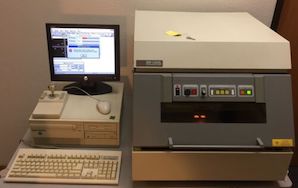Metal finishers helping each other -- No cost, No registration, No damn popups
(we earn from 'affiliate link' purchases, making the site possible)
Home /
T.O.C.
Fun
FAQs
Good
Books
Ref.
Libr.
Adver-
tise
Help
Wanted
Current
Q&A's
Site 🔍
Search
 Curated with aloha by
Curated with aloha by
Ted Mooney, P.E. RET
 The authoritative public forum
The authoritative public forum
for Metal Finishing 1989-2025

Thread 344/83
Imitation rhodium plating chemistry
Please --
• See also Topic 0037 "Albaloy, Miralloy, Optalloy copper/tin/zinc alloy plating"
• See also Topic 49751 "White Bronze Plating: an alternative to nickel"
• Search the site with 'white bronze' or trade names of white bronze platings for many other threads.
RFQ: My company is an injection moulder of plastics packaging for the cosmetic industry based in London,England. We have a need to find a company based in England who is capable of white brass electroplating onto ABS Plastic moldings which we produce. The moldings are approx. 100 mm dia. and look a bit like a very small car hubcap which has a radius of approx. 200mm. Is it possible that you know anyone who can help or an association like yours here in the UK that we can approach.
DAVID T [last name on old posting deleted for privacy by Editor]
- Wembley London England
2001
publicly reply to DAVID T
Ed. note: This RFQ is outdated, but technical replies are welcome, and readers are encouraged to post their own RFQs. But no public commercial suggestions please ( huh? why?).
A. Sir:
All I can say is "WOW." It has been over 20 years since I have heard of white brass being offered on the open market. It was offered during a nickel shortage, for application on parts in lieu of nickel plating. As I recall it even used specially made alloy anodes of Zinc and a small amount of Copper.
The manufacturer of the process was DuPont, but they have been out of that market for decades. I suggest that you scan the plating process suppliers in the U.K., first to see who might even still make this. Then, you may find someone who is using it.
Sincerely,

 Ed Budman [dec]
Ed Budman [dec]
- Pennsylvania
With deep sadness we advise that our good friend Ed passed away Nov. 24, 2018
publicly reply to Ed Budman
? Hi.
Is it possible that "white brass" and "white bronze" are the same thing? With leachable nickel forbidden in jewelry & similar items in the European Union, white bronze plating has become quite popular as a nickel substitute -- not only in England, but in India and many places.
Regards,
 Ted Mooney, P.E.
Striving to live Aloha
finishing.com - Pine Beach, New Jersey
publicly reply to Ted Mooney
Ted Mooney, P.E.
Striving to live Aloha
finishing.com - Pine Beach, New Jersey
publicly reply to Ted Mooney
Multiple threads merged: please forgive chronology errors and repetition 🙂
Who Does/Offers White Bronze Plating?
Q. I have a customer who is interested in our doing a barrel copper-tin-zinc tri-alloy deposit for electronics applications. The alloy goes by many names including "white bronze", "Albaloy", or "Sucoplate." I've also heard it referred to as using the "Tagusha" bath from Germany, however, I suspect that there are many available commercial applications (especially in Europe).
I'm looking to hear from people who've operated such baths. Is it difficult? What anode materials used? Is it readily solderable and how does it age? Who are potential suppliers for this chemistry? Any information in this regard would be appreciated and is most helpful.
Milt Stevenson, Jr.
- Syracuse, New York
2001
publicly reply to Milt Stevenson, Jr.
A. IT IS ALSO [called] TRI METALLIC ALLOY PLATING.
R.P.NAGILA
- INDIA
2001
publicly reply to R.P.NAGILA
A. There was a full page ad in the January 2001 Metal Finishing mag for a product called Miralloy (Cu/Sn/Zn alloy) by Degussa Galvanotechnik (maybe your 'Tagusha' is Degussa?) giving the North American distributor as Uyemura International Corp.
Regards
Richard Guise
- Lowestoft, U.K.
2001
publicly reply to Richard Guise
Q. One sees a lot of cheap rhodium plated imitation jewelry in the southeast Asian countries including China & these are not plated white bronze. What plating could this be?
Gusti Noria
- Hyderabad, India
2005
publicly reply to Gusti Noria
A. Hello Gusti,
It's white Nickel plating; Bright Nickel made to look whiter just like white bronze. Please pass on a hello to Mr Jal.
Regards,
 Khozem Vahaanwala
Saify Ind
Khozem Vahaanwala
Saify Ind
 Bengaluru, Karnataka, India
Bengaluru, Karnataka, India
 2005
publicly reply to Khozem Vahaanwala
2005
publicly reply to Khozem Vahaanwala
A. It is probably bright tin.
 Jeffrey Holmes, CEF
Spartanburg, South Carolina
2005
publicly reply to Jeffrey Holmes, CEF
Jeffrey Holmes, CEF
Spartanburg, South Carolina
2005
publicly reply to Jeffrey Holmes, CEF
A. Hallo Gusti,
I'm doing Imitation Rhodium or imitation chrome with white free solution which is tin & cobalt, over bright nickel it looks good, shines, but does not last like real rhodium.
This solution I get from Gold Touch [a finishing.com supporting advertiser]
 Dipen Pattni
jeweler/goldsmith - Dar-Es-Salaam, Tanzania
2005
publicly reply to Dipen Pattni
Dipen Pattni
jeweler/goldsmith - Dar-Es-Salaam, Tanzania
2005
publicly reply to Dipen Pattni
A. In China, some add cobalt to bright nickel plating bath to get Whiter finishing. This method is very low cost but easy tarnished.
J. Wong
- Hong Kong
2005
publicly reply to J. Wong
Q. Further to my earlier post on imitation rhodium I want to clarify that it is an assumption that there is a good substitute to rhodium. Reason being, the prices at which rhodium plated imitation jewelry is being sold in China/Thailand/Korea only strengthen this hypothesis. Maybe there are ways to plate real rhodium cheap? Any comments, please feel free to opine.
Gusti Noria [returning]
- Hyderabad, India
2005
publicly reply to Gusti Noria
A. Hi Gusti. Four experienced posters have told us that they are familiar with the use of --
• White nickel, a whiter nickel, possibly brightened with some cobalt,
• Bright tin plating, possibly with lacquer,
• Tin-cobalt plating over nickel plating
-- as substitutes for rhodium. So if you're sure it's not white bronze, and the economics preclude it being real rhodium, it may be one of those three. Good luck.
Luck & Regards,
 Ted Mooney, P.E.
Striving to live Aloha
finishing.com - Pine Beach, New Jersey
publicly reply to Ted Mooney
Ted Mooney, P.E.
Striving to live Aloha
finishing.com - Pine Beach, New Jersey
publicly reply to Ted Mooney
A. Hi Gusti,
You were right White Bronze with lacquer is used as Imitation Rhodium, Some others use Tin and lacquer.
With Regards,
Sridhar Bushigampala
- Canada
2005
publicly reply to Sridhar Bushigampala
Q. I am a costume jewelry manufacturer, can someone guide me on the properties of this imitation rhodium? Can we do a final plating layer of imitation rhodium on our costume jewelry. What will be the tarnishing properties and the wear resistance, as our customer asks for lasting for one year. Please reply.
Ahmed Jamsa
traders - Karachi, Sindh, Pakistan
2006
publicly reply to Ahmed Jamsa
A. Dear Ahmed,
White Bronze was introduced to possibly replace costly Palladium to have a barrier layer usually over copper and brass in Nickel free jewelry plating.By virtue of its bright white look resembling to Rhodium,Imitation Jewelry manufactures from mainly India, China, Hong Kong, Taiwan and now in Pakistan have opted to plate White Bronze to make cheaper jewelry. The finish and look can sometimes pass as original Rhodium and named it as duplicate Rhodium.
This is an alloy plating of Copper/tin/Zinc and the deposit have high wear resistance (500V).Platers use an anti tarnish dip to make sure it does not lose its glow though it is not a must.
Meanwhile the process has to be operated strictly as per the suppliers recommendations to get the desired result.
Regards
 T.K. Mohan
plating process supplier - Mumbai, India
2006
publicly reply to T.K. Mohan
T.K. Mohan
plating process supplier - Mumbai, India
2006
publicly reply to T.K. Mohan
Q. HI I HAVE BEEN LOOKING FOR SOLUTION FOR A LONG TIME - WHITE BRONZE YELLOWS OVER TIME. TIN COBALT WOULD BE VERY SOFT AND WOULD WEAR QUICKLY IN MY OPINION.
THE NICKEL OPTION WORRIES ME AS THE PRODUCT WOULD NO LONGER BE NICKEL-FREE -
HAS ANYONE TRIED ALLOYING THE NICKEL WITH SAY TIN TO CREATE A NEW ALLOY?
THANKS
WARREN
Warren Castle
- JOHANESSBURG , SOUTH AFRICA
2007
publicly reply to Warren Castle
Multiple threads merged: please forgive chronology errors and repetition 🙂
2007
Q. We have an electroplating plant for textile accessories (metals) like buckle, button, etc.
We have tanks of 500 liter and we use barrel for plating.base material is zamac and our process is
chemical degreasing (5 min)
electrical degreasing (2 min)
acid activation (2 min)
cu alkaline (30 min)
neutralize (1 min)
cu acid (40 min)
electrical activation (2 min)
white bronze (10 min)
Problem is that sometimes we get shiny white bronze, and sometimes low white bronze, and sometimes nickel type shade. One barrel of buckles has one shade and next barrel of buttons has some different shade, I have no answer to my customer why there are differences in shade. If some of you can help me whether it is in plating problem or because of different type of material.
Azhar Ali Mahar
process engineer - Karachi, Pakistan
publicly reply to Azhar Ali Mahar
2007
A. Hi Azhar,
White/yellow bronze plating is one of the most difficult platings and unless you maintain the bath with real care, you will end up getting results the way you said. Basically it is a 3 metal alloy plating; copper, tin, zinc and with other metals (in ppm) in proprietary formulations.
Best way is to follow the supplier manual to the dot.
1. Install a rectifier with amp/minute meter
2. Replenish additives at small intervals say 1000 amp/min.
3. Maintain cyanide conc. (Add 10 gm/ltr and see the change!)
I can help you if you come out with more details such as how you maintain the bath as of now.
Regards,
 T.K. Mohan
plating process supplier - Mumbai, India
publicly reply to T.K. Mohan
T.K. Mohan
plating process supplier - Mumbai, India
publicly reply to T.K. Mohan
2007
Q. Shade problem in white bronze.
for the replenishment of bath I have using volumetric analysis and hull cell test..i have given the details which I got usually on my hull cell panel.
1 opaque (white cloud) at LCD , sometimes at center
2 always yellow at HCD (this is a big problem for me, b/c in production I have experience the same problem when I am plating on big buckle of size 3 cm long or more)
3 black line at LCD
NOTE: we are using two additives , one works as surfactant and other is brightener...
MOHAN: as you are also a supplier ,so please can you tell me that what are the purpose of additives in white bronze and at which situation I take help of these additives?
thanks
Azhar Ali Mahar [returning]
process engineer - Karachi, Pakistan
publicly reply to Azhar Ali Mahar
2007
A. Azhar,
White bronze plating is done as you know with inert anodes such as SS. So it is clear that the additive you use contains all the required ingredients to replenish the bath including metals. That is the reason I told you to make additions at small intervals. Cyanide additions have to be done in the same way. From the hull cell result I think CN is low. Start adding cyanide @50-60 grms after every 5 kgs plated.
HCD yellow is common in bronze plating. apply small current say
0.5-1.0 amps/Dm square (5-10 amp/sq/ft). Use continuous filter
(solution movement is a must), have thermostat control temp to 50-60 degree.
I think you should be happy to receive suggestions whether I am a supplier or simply a person interested in helping friends like you!
Regards,
 T.K. Mohan
plating process supplier - Mumbai, India
publicly reply to T.K. Mohan
T.K. Mohan
plating process supplier - Mumbai, India
publicly reply to T.K. Mohan
A. Hi there,
There are people using white bronze on 'throw out' basis (small baths), but if you want to use the bath for longer runs and especially for barrel plating then one needs to have the atomic absorption instrument
⇦ this on
eBay
or
Amazon [affil links] to analyse the content, but if you have the job of same kind then amp/min/meter works, a good complexant with a very good proprietary brightening agent will help you solve all the problems.
Make additions at very short & regular intervals.
Hope this helps you.
Regards,
 Praveen Kumar
plating process supplier
Praveen Kumar
plating process supplier
Mumbai, India
2007
publicly reply to Praveen Kumar
Q. Assalam-o-alaikum, Mr.Mohan
I want to know about the standard concentration of Basic salts used in White Bronze electroplating and Process for the Best Result.Please guide me.
Mohammad Asif Patel
- Karachi, Pakistan
May 27, 2009
publicly reply to Mohammad Asif Patel
Q. I am a jeweler who is not used to dealing with anything other than sold precious plating. I read on your site what Imitation Rhodium is. Thank you, I have been looking and you're the only ones who could or would answer my question.
In light of this can you please tell me. What is the best way to keep the piece from tarnishing and how should I tell people to clean it.
Thanks
Teresa Benedetti
- Huntingtown, Maryland, USA
February 5, 2009
publicly reply to Teresa Benedetti
A. Dear all,
There are many possibilities to substitute for rhodium plating nowadays:
starting from the cheapest one:
- white bronze (CuZnSn)
- Platinium-Ruthenium 80/20
- Platinium Plating 100
- Platinium- Rhodium 50/50
To control those solutions it is recommended to have a proper Xray machine, a titration station, Hull Cell kit , and glass beaker [beakers on
eBay
or
Amazon [affil links] setup.
Of course you also can run these electrolytes by experience, min. 3 years experience. It's always good if you have an external analytical lab around; from time to time it may is helpful to work with
Good wishes, Florian
Florian Janus
Plating Consultant - Neuenburg
September 7, 2021
publicly reply to Florian Janus
Q. Dear Mr. Vahaanwala,
You mentioned the imitation rhodium plating is white nickel plating. How do we get this whiter finish in the bright nickel solution?
Regards
Hemal
Hemal Nagda
- Mumbai, India
March 28, 2009
publicly reply to Hemal Nagda
Multiple threads merged: please forgive chronology errors and repetition 🙂
Tri alloy plating on Aluminum alloy
Q. Hi,
Can we plate Tri alloy on aluminum conductor? will there be any issues when exposed to Salt spray test for 96 Hours?
Thanks
Thirumurthy v
Engineer - Bangalore, Karnataka, India
August 3, 2010
publicly reply to Thirumurthy v
A. Tri alloy does not tell some of us anything.
Salt spray is going to depend on the thickness, the quality of the zincate step and the quality of the plating step.
James Watts
- Navarre, Florida
August 5, 2010
publicly reply to James Watts
August 10, 2010
A. Dear Sir,
It's a common process and can be done. It will withstand the SST of 96 hours easily.
 Khozem Vahaanwala
Saify Ind
Khozem Vahaanwala
Saify Ind
 Bengaluru, Karnataka, India
Bengaluru, Karnataka, India
 publicly reply to Khozem Vahaanwala
publicly reply to Khozem Vahaanwala
? For those of us that are not in India, what is tri-plate? If it is an alloy, what are the %'s?
James Watts
- Navarre, Florida
August 12, 2010
publicly reply to James Watts
A. Trialloy is a registered trademark for a tin / zinc / cobalt - alloy from UMICORE.
br
Franz
Franz Gassner
automotive - Munich, Bavaria, Germany
August 16, 2010
publicly reply to Franz Gassner
 Thanks, Franz!
Thanks, Franz!
But your posting reinforces the validity of James Watts' complaint. Because the tin-zinc-cobalt alloy you are talking about is not the tin-zinc-copper 'white bronze' others have been talking about :-)
So how about it, Thirumurthy -- when you said "tri alloy", did you mean Umicore Trialloy® or did you mean white bronze alloys of copper, tin, and zinc ? Please flesh it out. Thanks.
Regards,
 Ted Mooney, P.E.
Striving to live Aloha
finishing.com - Pine Beach, New Jersey
August 16, 2010
publicly reply to Ted Mooney
Ted Mooney, P.E.
Striving to live Aloha
finishing.com - Pine Beach, New Jersey
August 16, 2010
publicly reply to Ted Mooney
adv.: Discover the choice made by manufacturers
nationwide for high quality jewelry plating & finishing

Disclaimer: It's not possible to fully diagnose a finishing problem or the hazards of an operation via these pages. All information presented is for general reference and does not represent a professional opinion nor the policy of an author's employer. The internet is largely anonymous & unvetted; some names may be fictitious and some recommendations might be harmful.
If you are seeking a product or service related to metal finishing, please check these Directories:
Finishing
Jobshops
Capital
Equipment
Chemicals &
Consumables
Consult'g,
& Software
About/Contact - Privacy Policy - ©1995-2025 finishing.com, Pine Beach, New Jersey, USA - about "affil links"












